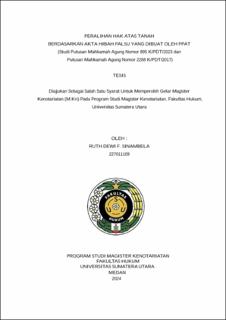| dc.description.abstract | Land holds a vital role in life as a place of residence, a source of livelihood, and an economic asset. The transfer of land rights often becomes a subject of legal disputes, including those involving gifts as regulated in Article 1666 of the Indonesian Civil Code, which defines a gift as the transfer of property without consideration. Despite clear regulations, gifts frequently lead to legal issues, particularly when fraudulent gift deeds are made by PPAT (Land Deed Officials). Notable examples include Supreme Court Decision Number 895 K/PDT/2023 and Decision Number 2268 K/PDT/2017, which address land disputes arising from fraudulent gift deeds. This study examines three key issues: the validity of land rights transfer through gift cleeds issued by PPAT, the process of creating gift deeds by PPAT, and the judicial considerations in court decisions regarding fraudulent gift deeds.
The research adopts a normative juridical method with a descriptive- analytical approach. Secondary data, including primary, secondary, and tertiary legal materials, are utilized. Data collection is conducted through library research and interviews. Qualitative analysis with deductive reasoning is employed to address the research questions.
The findings reveal that Gift Deed Number 400/2006 and Number 34/2003 are proven fraudulent. Consequently, the land sales based on these deeds are invalid and lack legal force. In Supreme Court Decision Number 895 K/PDT/2023, it was established that Gift Deed Number 400/2006 was fraudulent, rendering subsequent land sales void ab initio. Meanwhile, in Supreme Court Decision Number 2268 K/PDT/2017, the court granted the cassation request, acknowledging that the Judex Facti had erred in law application. However, the opposition filed by the objectors was deemed inadmissible, as it was submitted after the auction of the disputed land had been executed. The Supreme Court concluded that the legal remedy was procedurally defective, rendering the opposition inadmissible. | en_US |


